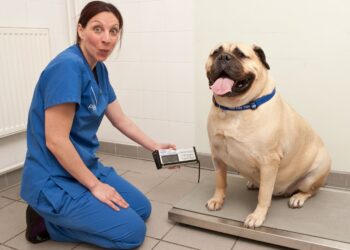Cushing’s disease is when there is an overproduction secretion of the stress hormone in the body. It’s a condition that typically starts to impact older dogs around age 6. Various breeds are more prone to suffering from this condition. Some of the more susceptible breeds include golden retrievers, germen shepherds, and terriers.
How To Identify Cushing?
There are a couple of things that you want to look for. If you notice that your dog is developing an excessively rounded belly, your dog might have Cushing’s. Another thing to look for would be losing fur for seemingly no reason. There are other signs too.
One would be that your dog is frequently drinking fluids and having to go to the bathroom more often. However, these are common symptoms of other things too. Therefore, it’s tough to figure out if your dog has Cushing’s from these symptoms alone.
Main Types Of Cushing’s
There are several types of Cushing’s disease that you should be fully aware of when it comes to dogs. One of them is known specifically as “Cushing’s disease.” This is caused by problems with the pituitary glands. Cushing’s syndrome is the all-encompassing name that describes any Cushing type of issue. This includes those that stem from pituitary glands, adrenal glands, and even drug-induced.
Both the adrenal and the pituitary glands are effectively responsible for the natural production and release of stress hormones in the body. When there is a malfunction with the glands, that’s when it can start to produce and release too many of them. This can result in the dog developing both liver and heart issues along with many other problems.
One of the 3rd forms of this type of disease in dogs is the direct result of drugs given to them. If your dog is taking various medications, it could be causing it. This is true even if it’s a basic skin problem. If your dog has skin inflammation, it may be prescribed medication. The medication could be a steroid.
A common steroid prescribed for inflammatory skin conditions includes prednisone. Unfortunately, when your dog’s body has outside steroid sources invading it, the adrenal glands can start to overproduce the stress hormones to compensate for it. This can result in them developing Cushing’s.
Some Of The Known Clinical Symptoms of Cushing’s Disease In Dogs
- Losing hair
- Increase in thirst, hunger, and urination
- Having a rounded belly
- Having thinner skin
- Excessively panting
- Getting easily bruised
- Being lethargic
- Sustaining a bladder infection
A Diagnosis
Your dog can be diagnosed by getting a physical examination done. They will look for clinical symptoms and they will take blood work, urine tests, x-rays, and even an ultrasound. These things can help a professional figure out if your dog has it.
Treatment Options In Dogs
If the disease is the direct result of the dog having a tumor in the pituitary gland, it’s usually treated with medication. The most common medication is Mitotane. This is a drug that effectively destroys some of the adrenal cortex which is responsible for producing stress hormones (cortisol).
There would need to be careful monitoring of your dog afterward to ensure it doesn’t have negative long-term effects and that proper cortisol production is restored afterward.
If it’s the adrenal gland causing the issues, surgical removal will be necessary. The tumor would be removed. If the tumor is benign, a full recovery is expected. However, it’s not going to be a good prognosis if the tumor is malignant and it has spread to various other areas in the body.
Iatrogenic Cushings can be treated by reducing corticosteroid intake slowly. These medications need to be stopped in a controlled manner to safely wean off them. This will allow the adrenal glands to get back to producing proper levels of cortisol.
Any treatment for dogs with Cushing’s disease can cause side effects but in general, you can look for natural treatment options available that are both effective and safe while also having fewer side effects. One such proven canine Cushing’s remedy come from Prana Pets and includes Lignans with melatonin for treating adrenal gland Cushing’s. Taking a natural approach is a good way to ensure that your pet heals safely.










